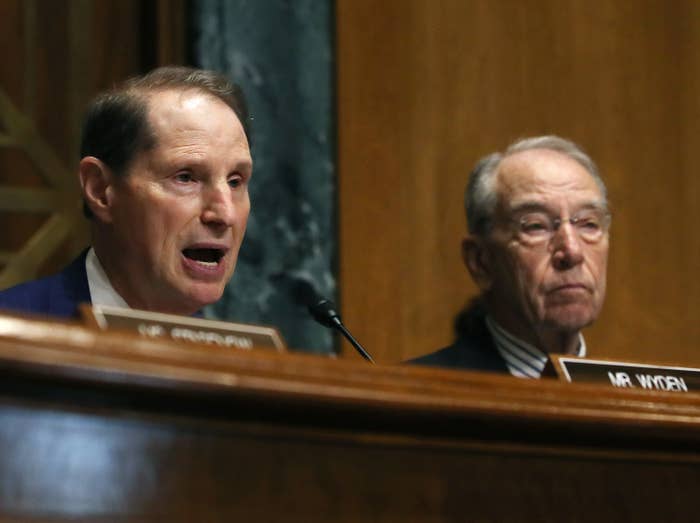
WASHINGTON — The Treasury Department has slow-rolled congressional requests from several lawmakers in recent years, raising questions about the department’s relatively quick response to a November request from Republican senators for sensitive financial information on former vice president Joe Biden’s son and the Ukrainian company for which he worked.
Last week, Treasury Secretary Steve Mnuchin testified that the department has complied with congressional requests for suspicious activity reports (SARs) “from both Republicans and Democrats on an equal basis.” Speaking before the Senate Finance Committee, Mnuchin said Treasury had responded to requests from several committees involving “thousands of SARs."
But BuzzFeed News has learned committees investigating Russian election interference and President Donald Trump have waited several months for Treasury’s Financial Crimes Enforcement Network (FinCEN) to turn over records, and some requests from Democrats have yet to be completely fulfilled. In the past, Treasury has been so uncooperative with Congress that senators — both Democrat and Republican — have resorted to holding up Treasury nominees to force the department to turn over documents.
“I’m deeply concerned that Treasury Department oversight requests are being politicized,” Sen. Ron Wyden, the top Democrat on the Finance Committee, said in a statement to BuzzFeed News this week. “I believe that requests should generally be handled in the order they are received, but that’s not how they are being handled under this administration. Requests that further Donald Trump’s interests should not be moved to the front of the line while requests that would shed light on potential wrongdoing by the president and his associates are slow-walked.”
But Treasury disputes that its handling of congressional requests has been politicized.
“The Treasury Department does not process congressional requests for FinCEN records on a partisan basis and has provided FinCEN records in response to requests from both sides of the aisle over the past year,” a Treasury official said in a statement to BuzzFeed News on Thursday. “In fact, the overwhelming majority of those productions have been in response to requests made or joined by Democratic members. Since January 2017, the Treasury Department has provided approximately 60,000 pages of FinCEN records in response to requests from the House and Senate Intelligence Committees — all of which were made or joined by Democratic members.”
On Nov. 15, Republican Sens. Chuck Grassley and Ron Johnson wrote to FinCEN seeking SARs on Hunter Biden, Burisma — the Ukrainian gas company where he served as a board member — and other figures. Grassley, the chair of the Senate Finance Committee, and Johnson, the chair of the Senate Homeland Security and Governmental Affairs Committee, ramped up an investigation into Democrats and Ukraine this fall while Trump’s impeachment on Ukraine-related matters made its way through Congress.
Banks file SARs to FinCEN when they identify transactions that bear the hallmarks of money laundering or other financial crimes. The reports themselves are not evidence of a crime — many are filed on transactions that are perfectly legal — but can be used to support investigations.
Treasury responded to the Republican senators’ request for SARs within about one month, according to a source familiar with the investigation. A spokesperson for Wyden said earlier this month that the department was “rapidly complying” with the request from the Republican senators “and producing ‘evidence’ of questionable origin.” At the time, a spokesperson for Grassley said it was “strange that any senator would complain about receiving responses to oversight requests in a timely manner.”

In contrast, others on Capitol Hill have faced months of delays after requesting records from FinCEN as part of congressional investigations. They include the House Intelligence and Financial Services committees, according to a Democratic official from the Intelligence Committee. The panels, which have been chaired by Democrats since the party took control of the House in 2019, have been investigating Trump’s relationship with German lender Deutsche Bank and whether the president is under the influence of foreign actors, among other things. The Intelligence Committee also spearheaded the impeachment inquiry.
“HPSCI has made a number of requests to Treasury since 2019, including to FinCEN for SARs,” said the official, speaking on background. “However, the requests are still incomplete, and the productions have taken longer than normal — in some cases many months. We also repeatedly had to follow up with Treasury officials to secure the productions.”
The official added, “Many of these requests were with the House Financial Services Committee as part of our foreign influence investigation.”
A spokesperson for the Financial Services Committee did not respond to repeated requests for comment.
The Republican-controlled Senate Intelligence Committee, which has been investigating Russian election meddling and possible collusion with the Trump campaign on a largely bipartisan basis for more than three years, has faced similar problems in getting records from FinCEN. One request for SARs dated August 2017 went at least four months without a response, according to letters previously obtained by BuzzFeed News. That year, FinCEN personnel privately discussed whether Treasury was trying to thwart the committee’s probe, emails showed.
Senators have sought to slow the confirmation of Treasury nominees to prompt the department to comply with congressional requests. In May 2017, Wyden said he would place a hold on a key Treasury nominee until the department provided the Finance and Intelligence committees with “information and documents related to Russia and its financial dealings with President Trump and his associates.” At the time, Sen. Mark Warner, the vice chair of the Intelligence Committee, said he would also oppose the nomination.
Later that year, Wyden said he had placed a hold on another nominee “because of the Treasury Department’s refusal to provide the Senate Finance Committee with Treasury documents related to Russia.” At the time, the Oregon senator was investigating the relationship between Russia and the NRA. His issue with Treasury wasn’t resolved until more than a year later.
Wyden isn’t the only senator who has sought to block Treasury nominees in an effort to get financial documents from the department. In January 2018, Grassley — then the top Republican on the Senate Judiciary Committee — announced he would hold up a nominee after FinCEN failed to provide records he requested nearly four months prior as part of his panel’s Russia investigation. He later accused Treasury of withholding documents from the committee. Grassley’s office did not return a request for comment.
Treasury says a variety of factors can affect how quickly FinCEN provides documents to lawmakers. Those factors include the “volume of the request, the law enforcement sensitivity of particular information, applicable privilege or legal protections, subsequent prioritization or guidance from the requesting Member of Congress or committee staff, and other resource demands,” the Treasury official said, adding that “it is common for the department to begin producing FinCEN records in response to congressional requests within 30 to 60 days, irrespective of the requester’s party affiliation.”
Wyden and Sen. Sherrod Brown, the top Democrat on the Senate Banking Committee, wrote to FinCEN in December to ask the agency to improve its relationship with Capitol Hill — and appeared to fire a warning shot about the Republican senators’ request for records on Hunter Biden and Burisma. “Information requests from Congress, including legitimate Committee oversight requests related to Suspicious Activity Reports (SARs), often take months to process, and we understand that certain such requests have yet to be answered at all,” the senators wrote. “In general, Congressional requests for such information should be handled in the order they are received, and prompt responsiveness by FinCEN is vital.”
Treasury says it doesn’t support processing congressional requests in the order they’re received. “We do not agree that an inflexible ‘first-in-first-out’ approach to requests for information would be appropriate, practicable, or helpful to Congress,” the department wrote in a January letter to Wyden, according to a person familiar with the letter. “It would make little sense, for example, to decline to begin work on a simple request for FinCEN information until a prior, complex request is entirely complete.”

